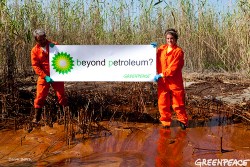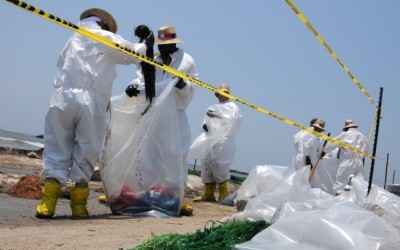 BP’s oil-spill cleanup operations have formally wrapped up in three of the four states that were polluted following the explosion of the Deepwater Horizon oil rig in 2010.
BP’s oil-spill cleanup operations have formally wrapped up in three of the four states that were polluted following the explosion of the Deepwater Horizon oil rig in 2010.
After more than three years of cleanup, that sounds like an occasion to party and then relax. But it isn’t. Not only has the Gulf Coast not recovered from the oil spill, but the hard work of environmental restoration has barely even begun. From the Associated Press:
The London-based oil giant said the Coast Guard has concluded “active cleanup operations” in Mississippi, Alabama and Florida, but the work continues along 84 miles of Louisiana’s shoreline. …
The Coast Guard will continue responding to reports of oil washing up anywhere along the Gulf Coast. BP said it will take responsibility for removing any oil that came from its blown-out Macondo well. …
The director of the National Wildlife Federation’s Gulf of Mexico Restoration Campaign said there is still much work to be done including rapid shoreline assessment and cleanup after storms.
“As much as one million barrels of oil from the disaster remains unaccounted for, and tar mats and tar balls from the spill continue to wash up on the coast,” said David White. “Regardless of how our shorelines are monitored, BP must be held accountable for the cleanup. We cannot just accept oiled material on our beaches and in our marshes as the ‘new normal.’”
White’s complaints aside, the focus now moves to spending a few billion dollars from BP and Transocean on projects to restore wounded coastlines — like rebuilding salt marshes, improving wetlands, and building a hotel.
Wait, what?
Yes, building a hotel.
Some of the restoration money is planned to be spent in ways that have raised eyebrows among local environmentalists. From a May 28 story by NPR:
Earlier this month, Alabama’s Gov. Robert Bentley stood on a sugar white state park beach to announce plans for an $85 million lodge and conference center. The event had all the trappings of an economic development announcement. State lawmakers, local mayors and business owners were all smiles to hear that the Legislature had finally, after years of stalemate, given the go-ahead for a hotel on state park property near Gulf Shores, Ala. The state can contract with private companies to build and run the facility. What pushed the hotel through this year, as noted by Lt. Gov. Kay Ivey, is that BP is footing the bill.
“Without costing the taxpayers a dime,” Ivey said at the announcement earlier this month.
It wasn’t just the natural environment that suffered when BP’s well blew out. Fishermen, tourist operators, and regular folks who enjoy spending their weekends at the beach also took hits. So part of the restoration funding will go toward running advertising campaigns to woo back visitors, constructing boat ramps, and, well, building a hotel. But some local enviros are worried about the precedent.
Technically, [says Casi Callaway, director of Mobile Baykeeper], the state may be able to call a hotel restoration. But she says it makes her uneasy about how future monies to compensate for the BP oil spill might be allocated. “When the very first thing that’s supposed to be environmental is going to an economic project, that’s not OK,” Callaway says.



